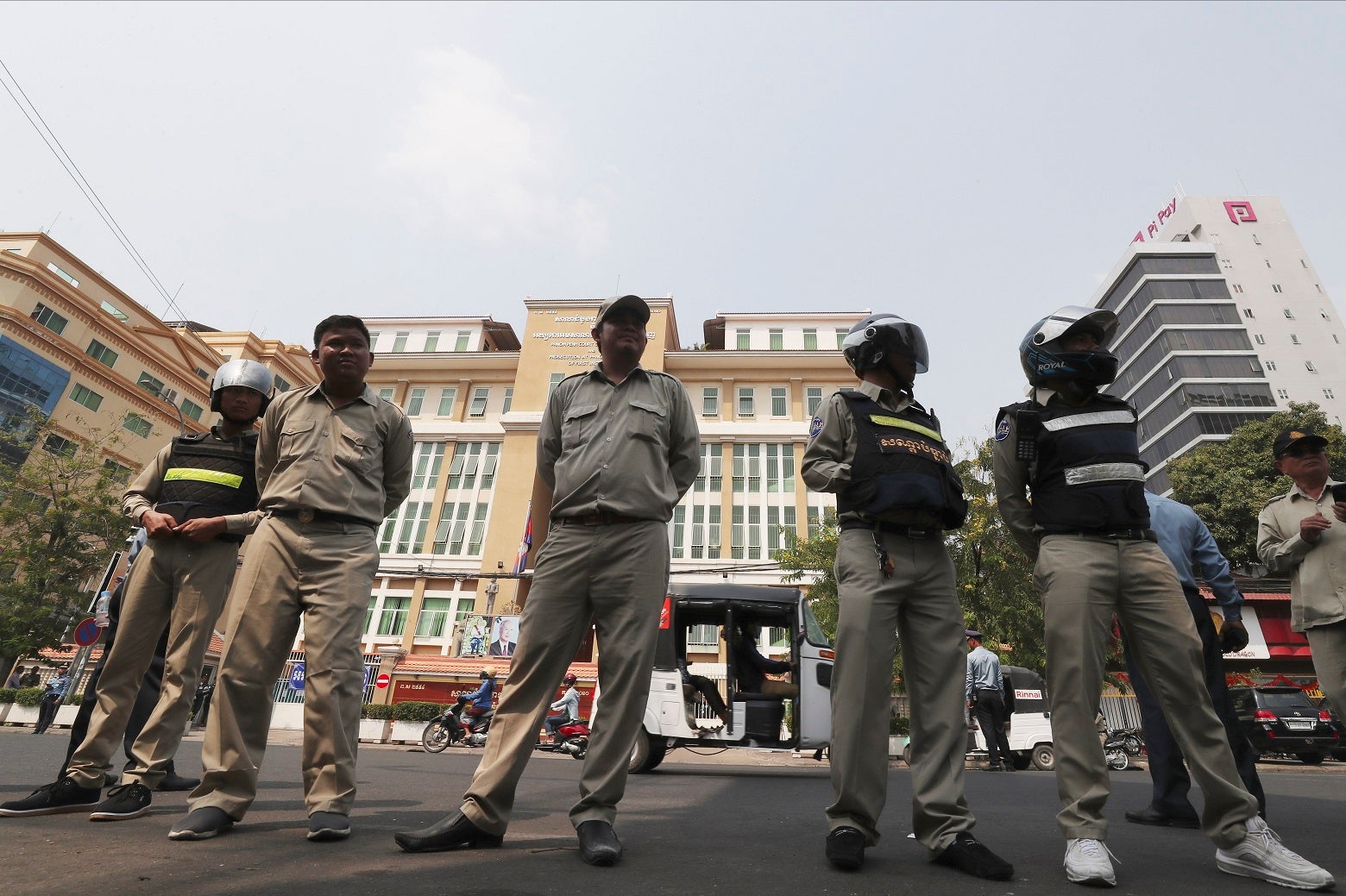Cambodia: Opposition Leader’s Trial Blocked to Public

Expand Cambodian police officers stand guard in front of the Phnom Penh Municipal Court during a hearing of Kem Sokha, the head of the dissolved Cambodia National Rescue Party, in Phnom Penh, Cambodia, Thursday, Jan. 16, 2020. © 2020 AP Photo/Heng Sinith (Bangkok) – The Cambodian opposition leader, Kem Sokha, is being denied his right to a public hearing in the fabricated criminal case against him, Human Rights Watch said today.
The Phnom Penh Municipal Court has denied journalists and human rights monitors access to the trial, which began January 15, 2020. Cambodian police officers stand guard in front of the Phnom Penh Municipal Court during a hearing of Kem Sokha, the head of the dissolved Cambodia National Rescue Party, in Phnom Penh, Cambodia, Thursday, Jan. 16, 2020. Human Rights Watch and other human rights groups have long called for dropping the politically motivated charges against Kem Sokha. On January 17, three United Nations special rapporteurs called Sokha’s trial “tainted.” “The bogus prosecution of Kem Sokha is made even worse by unjustifiably keeping the media and rights monitors out of the courtroom,” said Phil Robertson, deputy Asia director. “Cambodian authorities should drop the charges against Sokha instead of trying to keep his shabby and unlawful treatment out of public view.” Sokha’s trial for alleged espionage is expected to take three months, with two hearings a week, the court’s president said. Prior to the trial, the only evidence the prosecution presented was a highly edited video from 2013 that shows Kem Sokha giving a speech in Australia to his supporters. On January 10, the court issued a notice that only 30 seats were available for observers in the courtroom gallery and that those wanting to monitor the trial would need to register within a very short time frame. When reporters and human rights observers went to register, they were informed that 23 out of the 30 seats were reserved for diplomats and that they would be notified by January 13 if they would get an observer pass. As far as Human Rights Watch has been able to determine, no one seeking a pass ever heard from the court. On January 15, rights monitors and reporters appeared at the court but were told that the courtroom was full. Observers in the courtroom told Human Rights Watch that there were many unoccupied seats in the court’s public gallery on January 15 and 16. Two journalists who managed to enter the courtroom on the morning of January 15 were not allowed back inside for the afternoon session. Voice of America reported that about 200 police and other security forces were stationed at the court and streets leading to the court. Cambodia’s Foreign Affairs Ministry asserted that access to the courtroom was “at the discretion of the court, taking into consideration the actual court space, order and the conduct of the trial. Most of the diplomatic corps are represented and there were no empty seats in the courtroom.” However, article 14(1) of the International Covenant on Civil and Political Rights (ICCPR), to which Cambodia is a party, guarantees the right to a fair and public hearing by a competent, independent and impartial tribunal established by law.
The United Nations Human Rights Committee, which monitors state compliance with the covenant, has stated in its General Comment No. 32, that a public hearing “ensures the transparency of proceedings and thus provides an important safeguard for the interest of the individual and of society at large.” The committee noted that courts are to provide adequate facilities for the attendance of interested members of the public, within reasonable limits, taking into account the potential interest in the case.
The covenant allows for exceptional circumstances, such as national security, when the public may be excluded from a trial, the committee said. Otherwise a hearing must be open to the general public, including the media, and must not be limited to a particular category of people, such as the diplomatic corps. In February, the European Union will determine whether Cambodia’s human rights record has improved sufficiently to avoid losing the tariff-free entry to the EU market for Cambodian goods under the “Everything But Arms” (EBA) trade program. Kem Sokha’s case will be among the issues the EU review will be considering. “The empty seats at Kem Sokha’s trial make a mockery of government claims that there is no room for journalists and human rights monitors in the courtroom,” Robertson said. “We expect that the European Union and other concerned governments will be watching the Sokha case closely and the truth about these sham proceedings will eventually .
Read the full article at the original website
References:
- https://www.hrw.org/asia/cambodia
- https://www.hrw.org/news/2019/12/09/cambodia-drop-charges-against-opposition-leader
- https://www.ohchr.org/EN/NewsEvents/Pages/DisplayNews.aspx?NewsID=25472&LangID=E
- https://www.hrw.org/about/people/phil-robertson
- https://www.voacambodia.com/a/phnom-penh-court-kem-sokha-treason-trial-to-last-three-months/5244663.html
- https://cambojanews.com/journalists-ngo-monitors-could-be-kept-out-of-kem-sokha-trial/
- https://www.voacambodia.com/a/kem-sokha-arrives-for-first-day-of-treason-trial-/5246197.html
